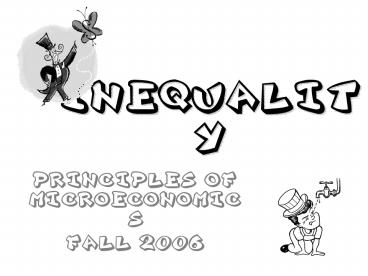INEQUALITY - PowerPoint PPT Presentation
Title:
INEQUALITY
Description:
INEQUALITY Principles of Microeconomics FALL 2006 INEQUALITY Principles of Microeconomics FALL 2006 George A. Akerlof (2003 interview with Der Spiegel): – PowerPoint PPT presentation
Number of Views:43
Avg rating:3.0/5.0
Title: INEQUALITY
1
INEQUALITY
- Principles of Microeconomics
- FALL 2006
2
(No Transcript)
3
(No Transcript)
4
- The CBO data show that between 1979 and 2003
- The average after-tax income of the top one
percent of the population more than doubled,
rising from 305,800 to 701,500, for a total
increase of 395,700, or 129 percent. (CBO
adjusted these figures for inflation and
expressed them in 2003 dollars.) - By contrast, the average after-tax income of the
middle fifth of the population rose a relatively
modest 15 percent, or 5,900, reaching 44,800 in
2003. - The average after-tax income of the poorest fifth
of the population rose just 4 percent, or 600,
over the past 24 years. - The top one percent of the population received
12.2 percent of national after-tax income in
2003, up from its already-large 7.5 percent share
in 1979. - In contrast, the shares of national income
received by various groups of low- and
middle-income people all fell. The middle fifth
of the population received 16.5 percent of the
national after-tax income in 1979, but only 15.5
percent in 2003. The bottom fifth received 6.8
percent of such income in 1979, but just 5.0
percent in 2003.
5
(No Transcript)
6
(No Transcript)
7
(No Transcript)
8
Greatest Increases in Income Inequality Between
the Top and the Bottom, Early 1990s to Early
2000s 1. Tennessee 2. Connecticut
3. Washington 4. North Carolina
5. Utah 6. Texas 7. West
Virginia 8. Pennsylvania 9. Florida
10. Maine
9
(No Transcript)
10
(No Transcript)
11
(No Transcript)
12
(No Transcript)
13
(No Transcript)
14
(No Transcript)
15
(No Transcript)
16
(No Transcript)
17
(No Transcript)
18
(No Transcript)
19
(No Transcript)
20
(No Transcript)
21
(No Transcript)
22
(No Transcript)
23
(No Transcript)
24
(No Transcript)
25
(No Transcript)
26
(No Transcript)
27
The World's Richest People
Making a billion just isnt what it used to be.
In its inaugural ranking of the worlds richest
people 20 years ago Forbes uncovered some 140
billionaires. Just three years ago they found
476. This year the list is a record 793, up 102
from last year. Theyre worth a combined 2.6
trillion, up 18 since last March. Their average
net worth 3.3 billion.
Name Citizenship Net
Worth Residence
(billion) William Gates III United States
50.0 United States Warren Buffett United
States 42.0 United States Carlos Slim
Helu Mexico 30.0 Mexico Ingvar
Kamprad Sweden 28.0
Switzerland Lakshmi Mittal India 23.5
United Kingdom Paul Allen United States
22.0 United States Bernard Arnault France
21.5 France Prince Alwaleed Bin Talal
Alsaud Saudi Arabia 20.0 Saudi
Arabia Kenneth Thomson Canada 19.6
Canada Li Ka-shing Hong Kong 18.8
Hong Kong
28
(No Transcript)
29
(No Transcript)
30
(No Transcript)
31
(No Transcript)
32
(No Transcript)
33
(No Transcript)
34
Food for thought. . .
George A. Akerlof (2003 interview with Der
Spiegel) "What we have here is a form of
looting. . .The rich don't need the money and are
a lot less likely to spend itthey will primarily
increase their savings. Remember that wealthier
families have done extremely well in the US in
the past twenty years, whereas poorer ones have
done quite badly. Paul Samuelson "If we made
an income pyramid out of a child's blocks, with
each layer portraying 1,000 of income, the peak
would be far higher than the Eiffel Tower, but
almost all of us would be within a yard of the
ground. Mr. Spock of "Star Trek" (describing
Ardana, where the rulers live in luxury in a
cloud city above miners working in misery) "This
troubled planet is a place of the most violent
contrasts. Those that receive the rewards are
totally separate from those who shoulder the
burdens. It is not a wise leadership."































